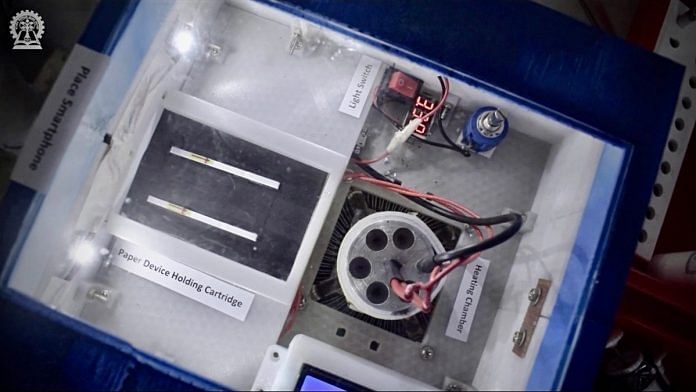
New Delhi: The Indian Institute of Technology (IIT) Kharagpur Wednesday announced that its Covid-19 test COVIRAP was ready for commercial use with the ICMR-National Institute of Cholera and Enteric Diseases (NICED) validating the device.
COVIRAP is a cuboid-shaped portable testing device that can deliver results in an hour, making it an effective tool to scale up Covid-19 screening in peripheral and rural areas.
At a virtual press conference held in IIT Kharagpur, Dr Mamata Chawla Sarkar, a senior scientist with ICMR-NICED who led the test validation process, said, “We collected 200 positive and negative samples. After blind labelling, they were tested in a real time RT-PCR machine and COVIRAP. Although we were initially sceptical about the outcome, when we compared the test results, we found the machine to be very accurate. The temperature controlled COVIRAP showed 94 per cent sensitivity and 96 per cent specificity.”
In a video conference held in July, Prof. Suman Chakraborty, department of mechanical engineering, IIT Kharagpur, and a member of the team that developed the testing kit, explained that the device functions on a pre-programmed test fed into the device.
“It has a microfluidic paper-based detection system; the colour of the microfluidic paper will determine if a sample is positive or negative.”
Kharagpur isn’t the only IIT to have developed a testing kit. IIT Delhi also developed a device, called Corosure. However, the researchers say COVIRAP is different from Corosure in how it processes the DNA sample.
“While Corosure replicates the process of testing used by an RT-PCR machine and is developed using indigenous techniques, COVIRAP has a unique temperature-controlled system of testing which is different from an RT-PCR test.”
Also read: Delhi scientists develop ‘non-fussy’ Covid test, say it’s cheaper & faster than RT-PCR
How COVIRAP works
The DNA of the virus is mixed with chemicals on a paper strip. The reaction determines if the sample is positive or negative. The result on the strip can be read using a mobile app, also developed by the team. The machine has a capacity to test between three and 10 samples in one go, which means the kit can be used for pool testing as well.
Further, the test has been devised keeping in mind the mutating nature of the SARS-CoV-2 virus.
Prof. Arindam Mondal, assistant professor, School of BioSciences, IIT Kharagpur, and part of the research team that developed COVIRAP, had in July explained, “Some of the genome sequences, which are proteins of the virus, remain conserved and are highly unlikely to change. The probe in the machine is designed and programmed in a way that it can identify these sequences. Advanced probes could be added to the device in the future when the need arises.”
Prof V.K. Tiwari, director, IIT Kharagpur, said Wednesday, “We had applied for a patent in July itself and since it is under process, we can claim rights on this intellectual property. We are in the process of finalising talks with several private and government companies regarding its mass production and will very soon start production.”
The COVIRAP takes an hour to show results and can be of much use in peripheral areas or distant rural areas where the health infrastructure might be lacking. The kit comes with a set of instructions in Bengali and Hindi, and can be operated by lab technicians with basic pathology skills.
The developer team said they simulated field testing to ensure COVIRAP has a consistently similar level of accuracy.
Prof Tiwari said the initial cost of the COVIRAP has been pegged at Rs 5,000, with each test costing about Rs 500. “If the government intervenes and subsidises it, the cost per test will reduce further,” he added. Earlier, the test was approximated to cost Rs 400.
Explaining the change in cost, Prof. Chakraborty told ThePrint, “The figures we discussed in the conference are ballpark estimates and these depend on the industrial cost of elements used to make the machine. The crux is that we are providing a low-cost testing kit which has high accuracy.”
Education Minister Dr. Ramesh Pokhriyal Nishank, who attended the video conference, lauded IIT Kharagpur for its contribution and said, “This innovation has made high-quality and accurate COVID testing affordable for the common people with a testing cost of around Rs 500, which can further be reduced through government intervention.”
Also read: Antibiotic Teicoplanin 10 times more effective than Covid drugs like HCQ, says IIT Delhi study

COMMENTS